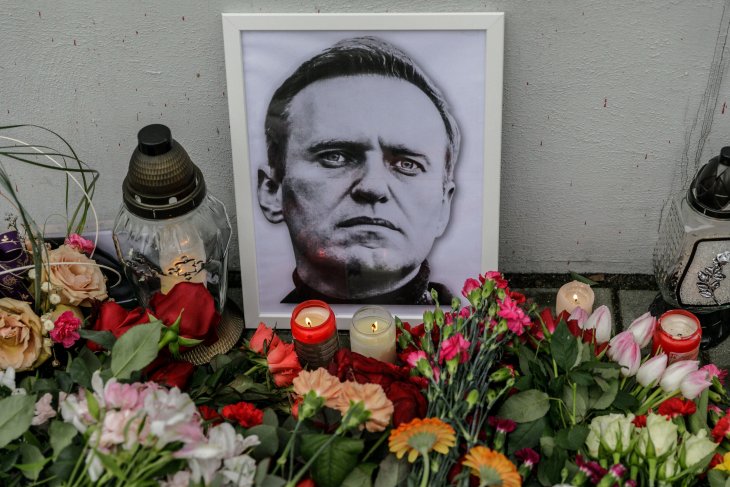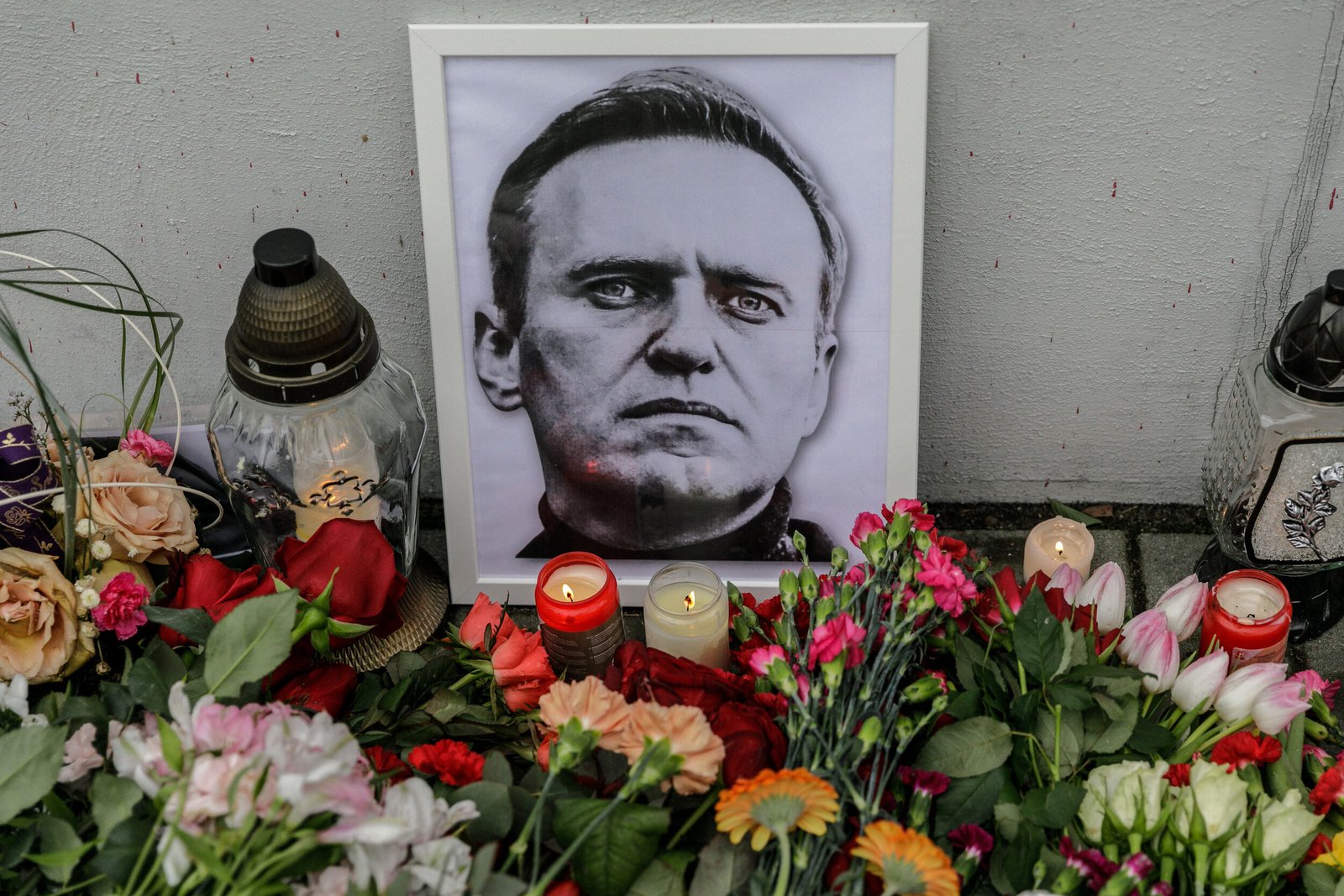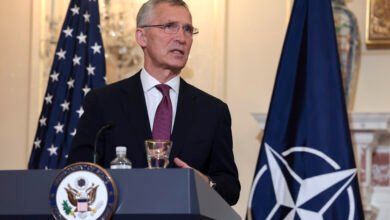This year’s Munich Security Conference recently took place on February 16 but was soon overshadowed by other events, which is becoming a tradition for the annual conference. In early February 2022, most high-level participants did not believe a Russian attack on Ukraine was imminent. In 2023, many expected decisive success in Ukraine’s much-anticipated counteroffensive. This year, the primary dealings were the signing of the French-Ukrainian and German-Ukrainian security pacts, specifying Europe’s commitments to Ukraine (RBC.ru, February 16; NV.ua, February 16).

Flowers, candles, and a portrait of Alexei Navalny, are placed near the walls of the Russian Embassy in Warsaw during the rally dedicated to the second anniversary of the full-scale invasion of Russia into Ukraine. Photo: Volha Shukaila/SOPA Images/LightRocket via Getty Images
The sudden death of Russian opposition figure Alexei Navalny, however, overshadowed these ceremonies. Navalny’s wife, Yulia Navalnaya, held Russian President Vladimir Putin personally responsible in her address in Munich (Moscow times, February 16).
US President Joe Biden also pinned responsibility for the crime on Putin. The Kremlin brushed off Biden’s accusation as “unacceptable” interference in Russia’s internal affairs (Meduza.io, February 16; RIA-Novosti, February 16). The wave of international outrage has been much louder than denials in Moscow, where the propaganda machine has been instructed to say as little as possible on the matter. The big question is whether the West’s reactions will have a serious political impact on Russia.
The first possible effect could be the US House of Representatives’ long-overdue approval of the $95 billion foreign aid package for Ukraine, Israel, and others, passed by the Senate last week (Kommersant, February 13). Partisan quarrels still stand in the way, but moral pressure to break the deadlock has increased since Biden connected Navalny’s murder to Congress’ failure to pass the aid package (RIA-Novosti, February 16). Increased support from the European Union and key European states would likely allow Ukrainian forces to keep holding their defensive lines, even after their retreat from Avdiivka (Meduza.io, February 14). Ukraine needs the renewed and expanded supply of US military hardware and ammunition, however, to prepare for a new counteroffensive and ensure the recapture of the initiative on the battlefield (TopWar.ru, February 16).
Second, Navalny’s death could spur progress on the seizure of Russian financial assets held in Western banks and channeling those funds toward rebuilding Ukraine (Forbes.ru, February 13). Without proper political will, legal arguments over this unprecedented step could continue indefinitely (RBC.ru, February 15; The Bell, February 15). A new determination to hold the Putin regime responsible for its crimes, including Navalny’s murder, may help mobilize this will. Tightening economic sanctions is also in the cards, especially the restriction of hydrocarbon exports (Re:Russia, February 14).
Third, and perhaps the most lasting shift, would be a change in how Western leaders view the possibility of peace talks with Putin. This prospect was given a new spin in Putin’s recent interview with Tucker Carlson. The Kremlin leader did not drop any new hints for practical proposals (Forbes.ru, February 9; TopWar.ru, February 15). He found it essential to clarify to his domestic audience that his determination to defeat all modern manifestations of “Nazism” remained unwavering and that an international network resembling the old Soviet Comintern model could be cultivated for this purpose (Nezavisimaya gazeta, February 15). Putin’s recycled history lecture on Ukraine being a natural part of Greater Russia was more than just a symptom of his geopolitical obsession. It was also an attempt to convey to US legislators his readiness to end the war if they voted to discontinue support to Ukraine (Novaya gazeta Europe, February 10).
The Europeans view Putin’s appeal as a tactic to buy time. A pause in hostilities would allow Moscow to rebuild its degraded military machine and put renewed military pressure on its neighbors (Kommersant, February 16). Even for audiences naïve enough to believe in the vague promise of peace or cynically sufficient that a deal with Moscow appears attractive, the shock of Navalny’s murder signifies the end of their hopes and calculations (Carnegie Politika, February 16). Putin’s credibility was dubious at best before. Now, he cannot possibly be a party to any peace talks.
Navalny’s death in a remote Arctic prison will impact more than just Putin. Many Kremlin henchmen — judges, jailors, agents of the special services, and shameless propagandists — had a hand in this crime and had good reasons to fear the consequences (Moscow Times, February 16). The corrupt courtiers and treacherous minions that might have contemplated disposing of their boss and pinning the blame for the disastrous war on him must now recognize that their offers to negotiate with the West would be measured with serious prejudice. The aging leaders in the various branches of Russia’s vast state bureaucracy, their younger deputies, and the top brass commanding the exhausted army effectively have no way out (Moscow Times, January 23).
These elites might feel compelled to close their ranks around their presumably irreplaceable autocrat, discredited and delusional as he may be. Their loyalty alone, however, cannot combat problems of demoralization on the frontlines and at home. Repressive autocracies can be relatively stable if they have sufficient resources for distribution and embezzlement. Still, the combination of the sustained stress of war and progressing economic degradation undercuts the durability of Russia’s dictatorship. Navalny’s murder may not become the spark that triggers the country’s implosion, but his point that Putin’s system of power is not viable because it is based on lies rings true (Svoboda.org, January 17).
Navalny’s belief that Putin’s state will perish one day may be too optimistic. Hard fighting and painful sacrifice are necessary to topple this cruel Leviathan. While Navalny made the latter his life’s work, it is up to Ukraine to carry out the former. Even in the face of retreat, Ukrainian soldiers keep pushing the Russian military closer to defeat, and every bit of Western support brings Kyiv’s victory closer. Ukraine’s ultimate victory on the battlefield is Russia’s best hope for rehabilitation, though the opposition leader who would have worked to convince the disgruntled populace that this dream can become a reality cannot step out of prison to rally the Russian people.
Source link




